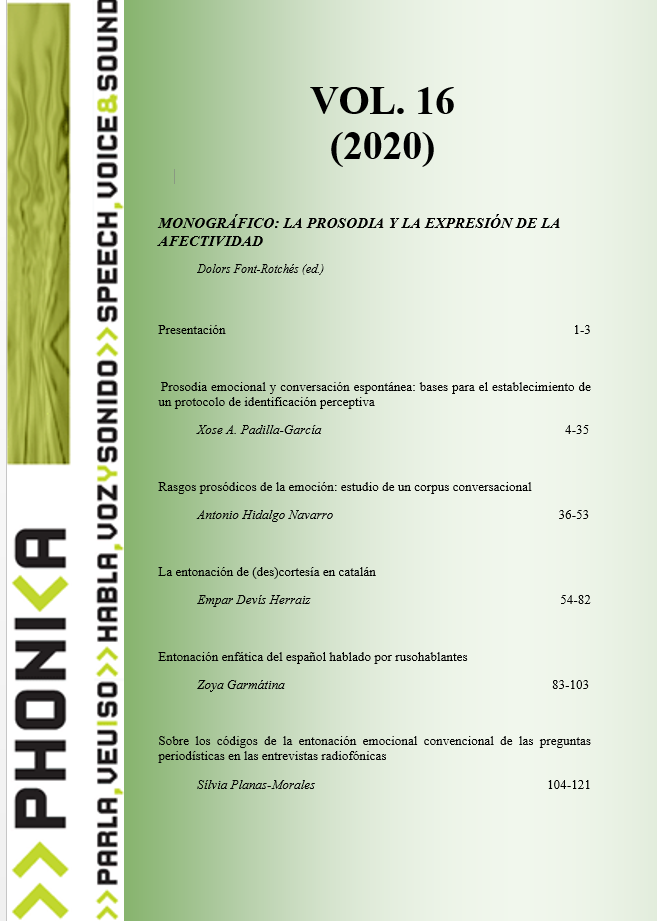Emphatic intonation in the Spanish spoken by Russian speaking people
DOI:
https://doi.org/10.1344/phonica.2020.16.83-103Keywords:
Intonation, Interlanguage, Spanish spoken by Russian people, EmphasisAbstract
In this paper, the first results of the analysis of emphatic intonation of Spanish spoken by Russian people are provided. To do the research, 15 hours of spontaneous conversations with ten native Russian speakers were recorded. They have an intermediate or advanced level of Spanish. From all recordings, we selected 70 emphatic statements with a strong emotional charge. For the analysis, we were based on the Melodic Analysis of Speech (MAS) method and the contours obtained from this interlanguage were compared with the emphatic patterns of peninsular Spanish. The results offer us the characterization of the emphatic intonation of Russian people spoken Spanish.
References
Abelin, Asa, Allwood, Jens (2000): «Cross-linguistic interpretation of emotional prosody». Proceedings of the ISCA Workshop on Speech and Emotion. Newcastle, Northen Ireland, 110-113.
Banse, Rainer, Sherer, Klaus. R. (1996): «Acoustic profiles in vocal emotion expression». Journal of Personality and Social Psychology 70 (3), 614–636.
Boersma, Paul.; Weenink, David. (2019): Praat: doing phonetics by computer [Computer program]. Version 6.0.51. http://www.praat.org/.
Cantero Serena, Francisco José. (2002): Teoría y análisis de la entonación. Barcelona, Edicions de la Universitat de Barcelona.
Cantero Serena, Francisco José; Alfonso, Raúl; Bartolí, Marta; Corrales, Anna; Vidal, Maribel (2005): «Rasgos melódicos de énfasis del español en habla espontánea». Phonica, 1.
Cantero, Francisco José; Font-Rotchés, Dolors (2007). «Entonación del español peninsular en habla espontánea: Patrones melódicos y márgenes de dispersión». Moenia. Revista Lucense de lingüística y literatura, 13, 69-92.
Cantero Serena, Francisco José (2008): «Complejidad y competencia comunicativa». Revista Horizontes de Lingüística Aplicada, 7(1), 71-87. http://www.revistahorizontes.unb.br.[08/12/2019].
Cantero Serena, Francisco José y Font Rotchés, Dolors (2009): «Protocolo para el análisis melódico del habla». Estudios de Fonética Experimental, XVIII, 17-32.
Cantero Serena, Francisco José; Font-Rotchés, Dolors (2020). «Melodic Analysis of Speech (MAS). Phonetics of Intonation». En Abasolo, J.; de Pablo, I.; Ensunza, A.: Contributions on education. Universidad del País Vasco, 20-47., 20-47.
Cantero, Francisco José; Ballesteros, Mapi; Mateo Ruiz, Miguel (2010):«Proyecto de investigación "Análisis melódico del habla». Actas del XXXIX Simposio Internacional de la Sociedad Española de Lingüística (SEL), 68.
Cantero Serena Francisco José; Devís Herraiz, Empar (2011): «Análisis melódico de la interlengua». En Hidalgo, Antonio; Congosto, Yolanda; Quilis, Mercedes (eds.): El estudio de la prosodia en España en el s. XXI: perspectivas y ámbitos. Valencia, Universitat de València, 285-299.
Cantero Serena Francisco José; Mateo Ruiz, Miguel (2011) «Análisis melódico del habla: complejidad y entonación en el discurso». Oralia: Análisis del discurso oral, 14, 105-128.
Lobanov, Boris (2014): «Universalnye melodicheskie portrety intonacionnyh konstrukcij russkoj rechi». Kompyuternaja lingvistika y intellektualnye tehnologii. Moskva, RGGU13 (20), 330-339.
Lobanov, Boris.; Zhitko, Vladimir.; Zahariev, Vadim. (2018): «Prototype of the Software System for Study, Training and Analysis of Speech Intonation». Speech and Computer: 20th International Conference, SPECOM 2018, Leipzig, Germany, September 18–22, 337–346.
Lobanov, Boris; Zhitko, Vladimir. (2019a): «Analiz prosodicheskikh priznakov jemocionalnoy intonacii s ispolzovaniem sistemy “IntonTrainer” (na primere russkojazychnyh fraz)». Kompyuternaja lingvistika y intellektual'nye tehnologii: Po materialam ezhegodnoj mezhdunarodnoj konferencii «Dialog». Moskva, 28/05 — 1/06/2018. Vyp. 18 (25). — Moskva, RGGU, 385-398.
Lobanov, Boris; Zhitko, Vladimir (2019b): «Software Subsystem Analysis of Prosodic Signs of Emotional Intonation». Speech and Computer: 21st International Conference, SPECOM 2019. Istanbul, Turkey, August 20–25, 2019, Proceedings / Eds. AlbertAliSalah, AlexeyKarpov, RodmongaPotapova. Springer, 280-288.
Mateo, Miguel (2010a). «Protocolo para la extracción de los datos tonales y curva estándar en análisis melódico del habla (AMH)». Phonica, 6, 49-90.
Mateo, Miguel (2010b). «Scripts en Praat para la extracción de datos tonales y curva estándar». Phonica, 6, 91-111.
Odintsova, Irina (2011): «Zvuki. Ritmika. Intonacija». Moskva, Flinta: Nauka.
Pao, TL; Chen, YT; Yeh, JH; Li, PJ (2006) «Mandarin emotional speech recognition based on SVM and NN». Proceedings of the 18th International Conference on Pattern Recognition (ICPR’06), vol. 1, 1096–1100.
Rinaldi, Carlo; Tedesco, Roberto; Matteucci, Matteo; Trivilini, Alessandro (2014): «Extracting Emotions and Communication Styles from Prosody». En da Silva, H.P; Holzinger, A.; Fairclough, S.; Major, D. (eds): Physiological Computer Systems. Berlin Heidelberg, Springer-Verlag, 21–42.
Scherer, Klaus; Schorr, Angela; Johnstone, Tom (eds.) (2001): Series in affective science. Appraisal processes in emotion: Theory, methods, research. Oxford University Press.
Trubetzkoy, Nikolai (1973). «Principios de fonología». (D. García Giordano & L. J. Prieto, Trans.). Madrid: Cincel. (Obra original publicada el 1939).
Ververidis, Dimitrios; Kotropoulos, Constantine; Pitas, Ioannis (2004): «Automatic emotional speechclassification». IEEE International Conference on Acoustics, Speech, and Signal Processing. Montreal, May 2004, vol. 1, 593-596.
Xiao, Zhongzhe, Dellandrea, Emmanuel; Dou Weibei; Chen Liming (2005): «Features extraction and selectionfor emotional speech classification». IEEE Conference on Advanced Videoand Signal Based Surveillance (AVSS), 411–416.
Downloads
Published
Issue
Section
License
The author(s) publishing in this journal agree to the following terms:
- The author(s) retains the copyright and grants the journal the right to the first publication of the work.
- All contents included in PHONICA are subject to the Creative Commons Attribution 4.0 International License, which allows the work to be shared with third parties, provided that they acknowledge its authorship, initial publication in this journal and the terms of the license.



